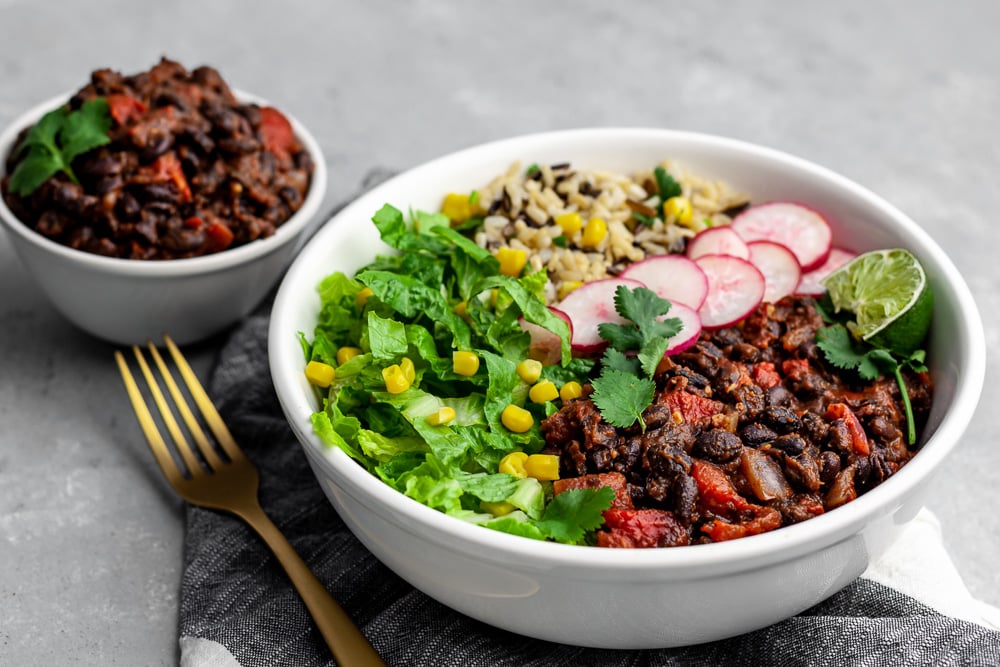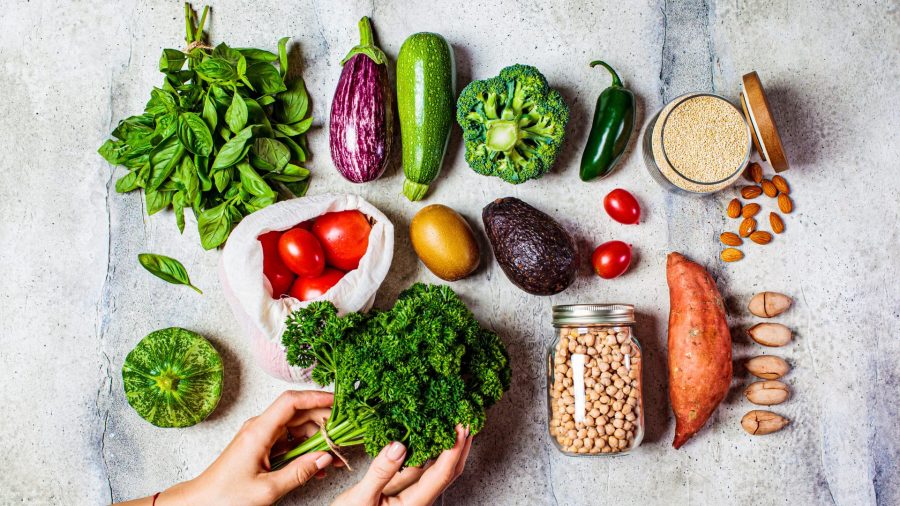Everything About Healthy Food: Advantages of Checking Out Plant Based Alternatives
The conversation surrounding plant-based diet plans has gained significant focus over the last few years. Lots of individuals are exploring the potential wellness advantages, nutritional advantages, and ecological effects connected with these dietary options. As individuals come to be a lot more familiar with their food's influence on wellness and sustainability, concerns arise concerning the usefulness of embracing such a lifestyle. What details modifications can one expect, and just how might these options reshape not just personal wellness however additionally the world's future?
Understanding Plant-Based Diet Regimens
Although lots of people connect plant-based diets generally with vegetarianism or veganism, these diets can incorporate a wide variety of eating patterns that focus on whole, minimally refined plant foods. Such diets usually include fruits, veggies, whole grains, nuts, vegetables, and seeds, while limiting or getting rid of animal products. This adaptability allows individuals to customize their nutritional choices according to nutritional requirements and individual choices. Some may embrace a largely plant-based diet while still sometimes consuming meat or dairy products, often referred to as a flexitarian technique. The emphasis continues to be on incorporating more plant foods, which can result in a varied selection of flavors and meals. Comprehending these different analyses of plant-based consuming is crucial for appreciating its ease of access and charm in modern food culture.
Health And Wellness Perks of Plant-Based Foods
The wellness advantages of plant-based foods are substantial, supplying a nutrient thickness benefit that sustains total health. Study shows that these foods can boost heart wellness and play an essential role in effective weight management. By including much more plant-based alternatives, people might improve their dietary choices and promote long-term wellness.
Nutrient Thickness Benefit
Nutrient density plays a vital function in the health advantages of plant-based foods, making them an engaging option for those seeking a balanced diet regimen. Plant-based foods, such as fruits, veggies, vegetables, nuts, and whole grains, are frequently rich in important vitamins, minerals, and anti-oxidants while being reduced in calories. This high nutrient density allows people to take in fewer calories while still fulfilling their dietary requirements. Additionally, these foods are loaded with dietary fiber, promoting digestive system wellness and helping in weight management. By including nutrient-dense plant-based choices, consumers can improve their overall wellness, support their immune systems, and lower the danger of persistent illness. Ultimately, the nutrient thickness of plant-based foods underscores their relevance in a health-conscious way of life.
Heart Health Renovation

Weight Monitoring Support
In addition to advertising heart health, a plant-based diet regimen can significantly assist in weight administration. This nutritional method stresses whole foods such as fruits, veggies, legumes, nuts, and entire grains, which are generally lower in calories and greater in fiber contrasted to animal-based items. The high fiber web content assists raise satiety, lowering overall calorie intake. Plant-based diet plans are often rich in necessary nutrients while low in unhealthy fats, making it much easier to keep a healthy weight. Research suggests that people that take on a plant-based lifestyle tend to have reduced body mass indexes (BMIs) and experience even more effective weight-loss contrasted to those who take in meat-heavy diet plans. As a result, welcoming plant-based alternatives is a strategic selection for effective weight monitoring
Nutritional Worth of Plant-Based Components
Plant-based components are rich in essential nutrients, providing a varied variety of vitamins, minerals, and antioxidants that add to overall health and wellness. A comparison of protein sources reveals that while animal products are frequently seen as remarkable, lots of plant-based choices supply sufficient protein and other advantageous compounds. Understanding the dietary worth of these components can assist individuals make informed nutritional selections.
Necessary Nutrients in Plants
Nutrient-rich components found in plants offer a varied selection of necessary minerals and vitamins that contribute considerably to general health. These ingredients are abundant in vitamins A, C, and K, which support immune function, vision, and blood clot, respectively. Furthermore, plants give crucial minerals such as magnesium, potassium, and calcium, important for heart health, muscular tissue function, and bone toughness. The existence of fiber in plant-based foods aids food digestion and promotes a healthy and balanced gut microbiome. Anti-oxidants, discovered perfectly in fruits and veggies, assistance combat oxidative stress and anxiety and decrease swelling. Several plant foods are low in calories yet high in nutrients, making them a superb choice for those looking for to maintain a healthy weight while making certain optimal nutrient consumption.

Contrasting Healthy Protein Resources
Protein sources differ substantially in their dietary profiles, with plant-based ingredients offering one-of-a-kind benefits. Unlike animal healthy proteins, which usually have hydrogenated fats and cholesterol, plant proteins often tend to be reduced in these undesirable components. Legumes, nuts, seeds, and entire grains are rich in important amino acids, fiber, vitamins, and minerals. For instance, lentils give high protein content along with considerable iron and folate, while quinoa is a full protein, using all 9 important amino acids. Additionally, plant-based healthy proteins are typically accompanied by antioxidants and phytochemicals that sustain general wellness. The shift to plant-based healthy protein resources not only boosts nutritional consumption yet likewise straightens with sustainable dietary practices, lowering environmental influence and promoting long-lasting wellness benefits.
Environmental Influence of Plant-Based Eating
As awareness of environment modification grows, many individuals are checking out lasting nutritional choices that can substantially minimize their ecological footprint. Plant-based eating has arised as a significant contributor to minimizing greenhouse gas emissions, which are mainly connected with animals production. The cultivation of fruits, vegetables, grains, and vegetables typically requires fewer resources, such as water and land, compared to animal farming. Furthermore, plant-based diet regimens can bring about lowered deforestation, as less land is needed for grazing livestock or growing animal feed. By shifting towards plant-based options, consumers can support biodiversity and promote healthier environments. Generally, embracing plant-based consuming not just advantages individual health and wellness however likewise stands for a crucial step toward ecological sustainability and preservation efforts.
Overcoming Common Misconceptions
While numerous individuals recognize the advantages of a plant-based diet plan, several mistaken beliefs typically discourage them from fully welcoming this way of life. A common belief is that plant-based diets lack sufficient healthy protein; however, countless plant resources, such as legumes, nuts, and tofu, supply sufficient protein. In addition, some think that this diet plan is expensive, when in fact, staples like beans, rice, and seasonal veggies can be rather cost effective. One more misunderstanding is that you can find out more plant-based eating is extremely restrictive, whereas it actually uses a diverse array of foods and tastes. Finally, lots of worry that a plant-based diet regimen may lead to shortages, yet with proper preparation, individuals can get all needed nutrients, including minerals and vitamins, while delighting in a variety of delicious dishes.
Tips for Transitioning to a Plant-Based Lifestyle
Making the shift to a plant-based way of living can be an enriching experience, though it usually requires some support to browse the initial adjustments. Initially, people are encouraged to start progressively, incorporating more fruits, veggies, vegetables, and whole grains right into their meals while decreasing meat and milk consumption. Meal planning is necessary; preparing an once a week food selection can assist ease the modification and stop final harmful choices. Exploring new recipes and cooking techniques can additionally enhance the experience and maintain excitement about plant-based eating. Furthermore, joining support system or neighborhoods can supply motivation and share useful ideas. redirected here Ultimately, remaining notified regarding nutrition assurances balanced meals, avoiding deficiencies while fostering a healthy and balanced, satisfying plant-based way of living.
Delicious Plant-Based Dish Ideas
Checking out scrumptious plant-based dish ideas can influence people to welcome an extra healthy diet plan. One popular choice is a passionate quinoa salad, including cherry tomatoes, cucumber, and a zesty lemon-tahini dressing. One more fave is a savory lentil stew, packed with carrots, celery, and aromatic natural herbs, excellent for a comforting dinner. For breakfast, overnight oats made with almond milk, chia seeds, and topped with fresh berries supply a nourishing beginning to the day. In addition, a vibrant vegetable stir-fry with tofu and a range of vibrant veggies can be a quick yet satisfying meal. Lastly, luscious avocado salute on whole-grain bread, sprayed with seeds and seasonings, offers a simple yet flavorful snack. These meals showcase the selection and splendor of plant-based consuming.

Frequently Asked Inquiries
Can a Plant-Based Diet Plan Provide Sufficient Protein?
The inquiry of whether a plant-based diet plan can give adequate protein is typical. Numerous resources, including vegetables, nuts, seeds, and whole grains, can satisfy protein needs effectively, sustaining a nourishing and balanced diet regimen for individuals.
Are Plant-Based Diet Regimens Suitable for Kid?
The suitability of plant-based diet plans for youngsters depends upon cautious preparation. Sufficient nutrients have to be guaranteed, consisting of proteins, minerals, and vitamins. With appropriate assistance, such Discover More Here diets can sustain healthy and balanced growth and advancement in children.
Exactly how Do I Eat in restaurants on a Plant-Based Diet regimen?
Eating out on a plant-based diet regimen includes seeking dining establishments with varied food selections, requesting for alterations, and exploring vegan-friendly alternatives. Planning in advance and connecting dietary choices can boost the eating experience while preserving nutritional selections.
What Prevail Allergens in Plant-Based Foods?
Typical irritants in plant-based foods consist of soy, gluten, nuts, and seeds - Sugar Free Sauces. People adhering to a plant-based diet ought to recognize these irritants and review tags carefully to avoid unfavorable reactions and ensure risk-free usage
Can Plant-Based Diets Assist With Weight Loss?
Research indicates that adopting a plant-based diet may facilitate weight reduction because of its normally reduced calorie density and higher fiber content. This combination can enhance satiety, aiding people handle their calorie intake efficiently. Numerous individuals link plant-based diet regimens generally with vegetarianism or veganism, these diet plans can include a broad range of eating patterns that focus on entire, minimally processed plant foods. Nutrient density plays an important role in the health advantages of plant-based foods, making them an engaging option for those seeking a well balanced diet plan. Plant-based diet plans have been revealed to substantially enhance heart health and wellness, as they frequently contain components that support cardiovascular feature. In addition to advertising heart health and wellness, a plant-based diet can considerably assist in weight administration. A common idea is that plant-based diets do not have adequate healthy protein; nevertheless, numerous plant resources, such as vegetables, nuts, and tofu, give adequate protein.
Comments on “The Science Behind Why BBQ Sauces Make Plant-Based Dishes Irresistible”